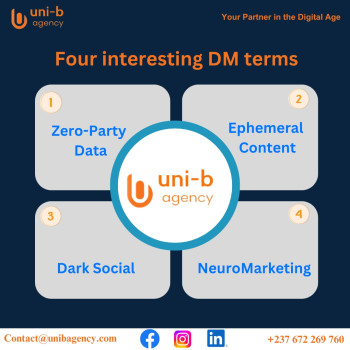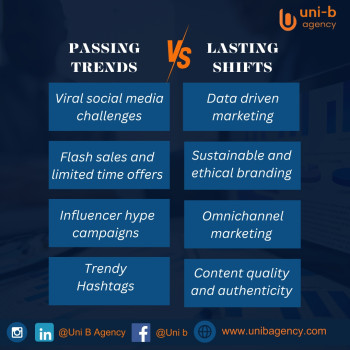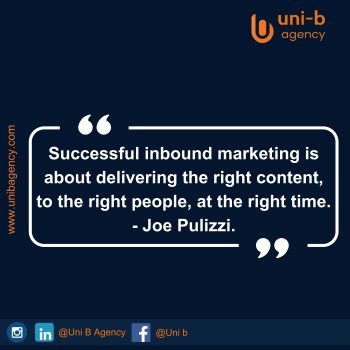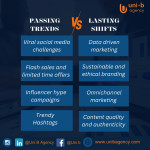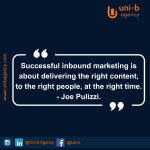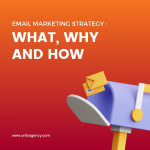In the bustling arena of digital marketing, where metrics
and numbers often reign supreme, there's a powerful quote that challenges our
conventional thinking:
"Don't count the people you reach. Reach the people who
count."
This simple yet profound statement invites us to reassess
our marketing strategies and focus on what truly matters. Let's dive deep into
this concept and explore how it can transform your marketing approach.
The Allure of Big Numbers
It's easy to get caught up in the numbers game. We live in
an age where follower counts, impressions, and reach are often seen as the
ultimate indicators of success. Marketers and businesses alike can fall into
the trap of chasing these vanity metrics, believing that a wider reach
automatically translates to better results.
But does it really?
Quality Over Quantity: A Paradigm Shift
The quote challenges us to shift our focus from quantity to
quality. It's not about how many people you can reach, but about reaching the
right people – those who are genuinely interested in your product or service,
those who are likely to engage with your brand, and those who have the
potential to become loyal customers.
This approach aligns with the Pareto Principle, also known
as the 80/20 rule, which suggests that roughly 80% of effects come from 20% of
causes. In marketing terms, this could mean that 80% of your business might
come from 20% of your customers. By focusing on reaching and nurturing this
crucial 20%, you can potentially achieve better results than by casting a wide,
unfocused net.
The Power of Targeted Marketing
So, how do we reach the people who count? The answer lies in
targeted marketing. Here are some strategies to consider:
1. Develop Detailed Buyer Personas
Create
comprehensive profiles of your ideal customers. Go beyond basic demographics
and delve into their psychographics, behaviors, pain points, and aspirations.
2. Leverage Data Analytics
Use data to
understand your audience's behavior, preferences, and engagement patterns. This
insight can help you tailor your marketing efforts more effectively.
3. Create Personalized Content
Craft content that
speaks directly to your ideal customers. Address their specific needs,
challenges, and interests.
4. Utilize Niche Platforms
Identify where your
target audience spends their time online and focus your efforts on those
platforms, even if they have a smaller overall user base.
5. Implement Account-Based Marketing (ABM)
For B2B businesses,
consider an ABM approach where you target specific high-value accounts with
personalized campaigns.
6. Leverage Influencer Partnerships
Collaborate with
influencers who have a strong connection with your target audience, rather than
just those with the largest following.
The Benefits of Focused Outreach
By prioritizing quality connections over sheer numbers, you
can reap numerous benefits:
1. Increased Conversion Rates
When you're
reaching people who are genuinely interested in what you offer, they're more
likely to convert.
2. Improved Customer Retention
By focusing on the
right audience, you're more likely to attract customers who will stick around
for the long haul.
3. Enhanced Brand Loyalty
When customers feel
that your brand understands and caters to their specific needs, they're more
likely to develop a strong allegiance to your brand.
4. Optimized Marketing Budget
Targeted marketing
often leads to better ROI as you're not wasting resources on reaching
uninterested parties.
5. More Meaningful Engagement
Quality audience
members are more likely to engage deeply with your content, providing valuable
feedback and insights.
6. Word-of-Mouth Marketing
Satisfied customers
from your target audience are more likely to become brand advocates, spreading
the word about your business.
Challenges and Considerations
While the concept of reaching "the people who count" is powerful, it's not without its challenges:
1. Identifying Your Target Audience
Pinpointing exactly
who "counts" for your business can be a complex process requiring
ongoing research and refinement.
2. Balancing Focus and Growth
While focusing on
your core audience is crucial, be careful not to narrow your focus so much that
you miss opportunities for growth.
3. Adapting to Changes
Your target
audience may evolve over time. Stay flexible and be prepared to adjust your
strategies as needed.
4. Measuring Success
Develop new KPIs that align with this
approach, focusing on engagement, conversion, and customer lifetime value
rather than just reach.
Implementing the Strategy: A Step-by-Step Approach
1. Audit Your Current Audience
Analyze your
existing customer base to identify your most valuable customers.
2. Create Detailed Personas
Develop
comprehensive profiles of these ideal customers.
3. Analyze Your Channels
Determine which
marketing channels are most effective in reaching your target audience.
4. Craft Tailored Content
Develop content
strategies that speak directly to your ideal customers' needs and interests.
5. Implement and Test
Launch your
targeted campaigns and closely monitor their performance.
6. Gather Feedback
Regularly seek
input from your audience to ensure you're meeting their needs.
7. Refine and Iterate
Use the insights
you gain to continually improve your targeting and messaging.
Conclusion:
Quality Connections in a Quantity-Driven World
In an era where we're bombarded with countless marketing
messages daily, standing out means reaching the right people, not just reaching
many people. By focusing on those who truly matter to your business, you'll
build stronger relationships, achieve more meaningful results, and create a
sustainable foundation for long-term success.
Remember: It's not about how many people you reach, but
about reaching the people who count. This approach may require more effort and
precision, but the rewards – in terms of engagement, loyalty, and business
growth – can be truly transformative.
As you move forward with your marketing efforts, challenge
yourself to look beyond the vanity metrics. Instead, focus on creating genuine
connections with the audience that matters most to your business. In doing so,
you'll not only improve your marketing effectiveness but also build a more
resilient and loyal customer base that will support your business for years to
come.

